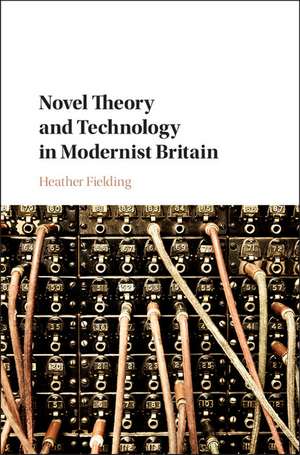Novel Theory and Technology in Modernist Britain
Autor Heather Fieldingen Limba Engleză Hardback – 25 apr 2018
Preț: 626.10 lei
Preț vechi: 688.02 lei
-9% Nou
Puncte Express: 939
Preț estimativ în valută:
119.81€ • 128.11$ • 99.89£
119.81€ • 128.11$ • 99.89£
Carte disponibilă
Livrare economică 28 martie-11 aprilie
Livrare express 13-19 martie pentru 29.66 lei
Preluare comenzi: 021 569.72.76
Specificații
ISBN-13: 9781108426046
ISBN-10: 1108426042
Pagini: 206
Dimensiuni: 158 x 235 x 15 mm
Greutate: 0.43 kg
Editura: Cambridge University Press
Colecția Cambridge University Press
Locul publicării:New York, United States
ISBN-10: 1108426042
Pagini: 206
Dimensiuni: 158 x 235 x 15 mm
Greutate: 0.43 kg
Editura: Cambridge University Press
Colecția Cambridge University Press
Locul publicării:New York, United States
Cuprins
Introduction. Readers and machines in modernist novel theory; 1. Point of view as projector: Henry James, Percy Lubbock, and the modernist management of reading; 2. What carries the novel: Ford Madox Ford, Impressionist connectivity, and the telephone; 3. 'Every age has been 'a machine age'': Wyndham Lewis and the novel's technological temporality; 4. From empathy to the super-cortex: Rebecca West's technics of the novel; Conclusion. Novel theory and technology in late Modernism.
Recenzii
'… Fielding offers a valuable discussion of modernist theories of the novel that renews ongoing debates over aesthetic divisions between high culture and mass culture, while also showing how these theories are often modulated through discourses of technology. Her knowledge of narrative theory and modernist aesthetics is impressive, and her readings make important contributions to the scholarship on James, Ford, Lewis, and West. Her extensive research also draws attention to figures such as Percy Lubbock and Q. D. Leavis who helped to shape the ways in which modernist novelists thought about form. Fielding's book brings into focus a fascinating debate over the aesthetics and epistemology of the modern novel as a technology for knowing.' Andrew Gaedtke, Modernism/modernity
'Novel Theory and Technology in Modernist Britain is an exacting study … Fielding admirably succeeds in carrying her own readers through this patient analysis of the formal strategies and critical theories the four writers (Henry James, Ford Madox Ford, Wyndham Lewis, and Rebecca West) she analyzes developed to mount a 'resistance to reading'.' Damien Keane, Twentieth-Century Literature
'This is the value of Fielding's intervention: it is almost tailor-made for answering [Michaela] Bronstein's call for clear alternatives to the context-based historicist approaches to modernism, even as Fielding is interested in making arguments about changes in literature over time.' Shawna Ross, The Year's Work in English Studies
'Novel Theory and Technology in Modernist Britain is an exacting study … Fielding admirably succeeds in carrying her own readers through this patient analysis of the formal strategies and critical theories the four writers (Henry James, Ford Madox Ford, Wyndham Lewis, and Rebecca West) she analyzes developed to mount a 'resistance to reading'.' Damien Keane, Twentieth-Century Literature
'This is the value of Fielding's intervention: it is almost tailor-made for answering [Michaela] Bronstein's call for clear alternatives to the context-based historicist approaches to modernism, even as Fielding is interested in making arguments about changes in literature over time.' Shawna Ross, The Year's Work in English Studies
Notă biografică
Descriere
Reveals that technology played a major role in modernism's theory of the novel.
